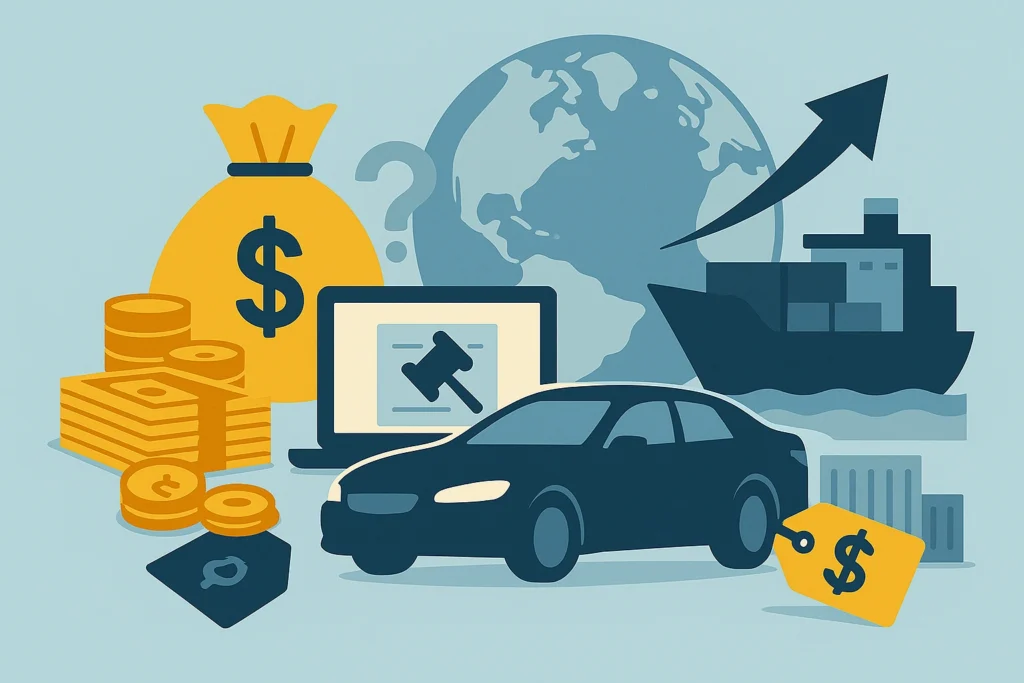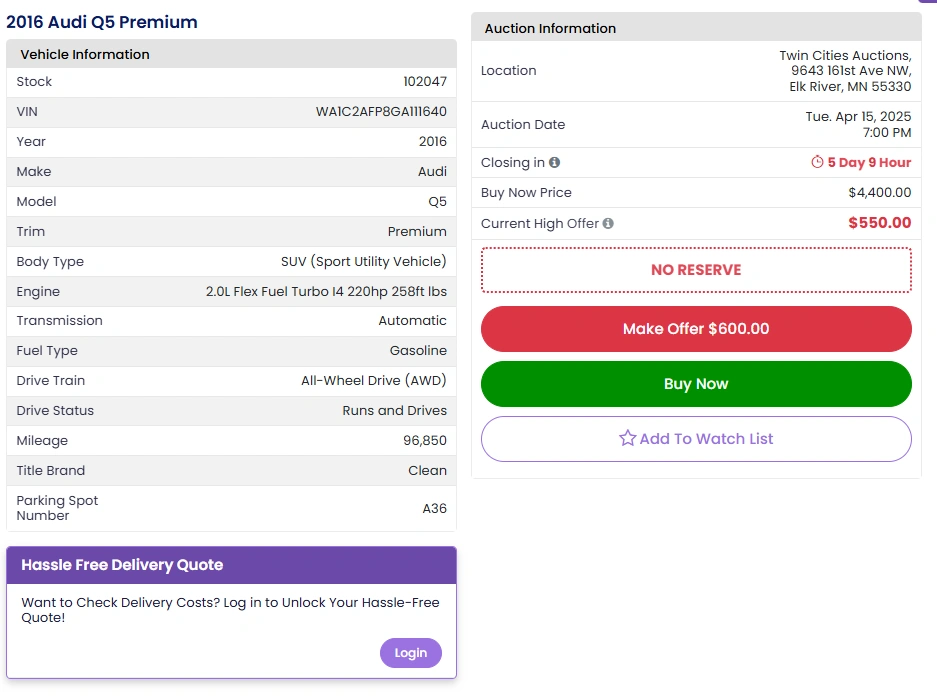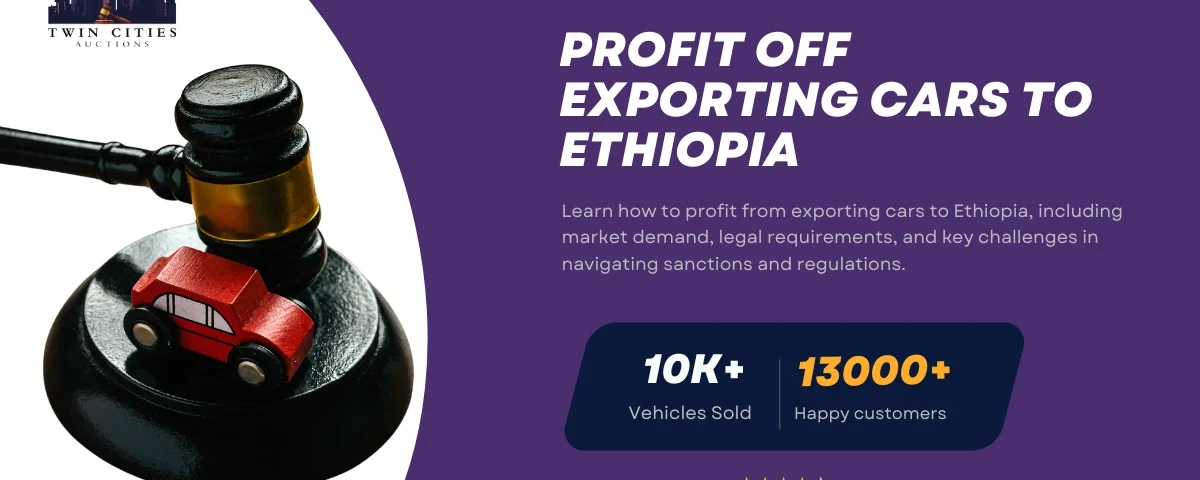Did you know Ethiopia imported an estimated 25 000–30 000 passenger vehicles in 2023, representing roughly 150 million USD and growing at around 10 percent annually?
U.S. exporters tapping this demand have boosted profit margins by up to 18 percent within six months. This guide shows you how to comply with regulations, calculate costs, and organize logistics for maximum returns.

Key Takeaways
- Ethiopia imported about 25 000–30 000 vehicles in 2023
- Import costs add roughly 40 percent of vehicle value
- Profit equals landed cost plus your margin
- Main ports: Djibouti and Berbera
- Required documents: invoice, bill of lading, import permit, Certificate of Conformity
- Best sourcing: U.S. auto auctions
Understanding the Ethiopian Market
In January 2024, Ethiopia implemented a groundbreaking policy by banning the import of gasoline and diesel vehicles, positioning itself as the first country globally to take such a step.
This move aims to reduce reliance on costly fuel imports, which amounted to over €6 billion by 2023, and to promote environmental sustainability.
However, the transition faces challenges due to limited infrastructure, including only one public charging station and scarce spare parts for electric vehicles. These factors have led to logistical issues and concerns among consumers and dealers.
| Metric | Figure |
| Vehicles Imported | 25 000–30 000 units |
| Estimated Market Value | 140–160 million USD |
| Year‑over‑Year Growth | ~10 percent |
Source: Ethiopian Statistics Agency
Regulations and Compliance
Ethiopia enforces strict regulations on vehicle imports, including a seven-year maximum age limit and mandatory safety and emissions certifications.
Importers must obtain a Certificate of Conformity from an accredited body to ensure compliance with national standards.
Additionally, an import permit from the Ministry of Transport is required for all vehicle imports. These measures are part of Ethiopia’s broader strategy to modernize its vehicle fleet and reduce environmental impact.
Source: Ethiopian Revenues and Customs Authority
| Document | Purpose | Required For |
| Commercial Invoice | Declares sale value | All imports |
| Bill of Lading | Proof of maritime shipment | Sea‑borne imports |
| Import Permit | Government authorization | All vehicle imports |
| Certificate of Conformity | Verifies safety & emissions compliance | All imports |
Building Your Landed‑Cost & Profit Model
Accurate cost modeling is critical. Use ERCA’s tariff bands for your calculations:
| Cost Item | Rate Range | Calculation Example (USD) |
| CIF Cost | — | 10 000 |
| Import Duty | 20–30 percent | 2 500 (25 percent assumed) |
| Value Added Tax | 15 percent | (10 000 + 2 500) × 0.15 = 1 875 |
| Miscellaneous Fees | 3–5 percent | 10 000 × 0.04 = 400 (4 percent) |
| Total Landed | — | 14 775 |
Source: ERCA Tariff Estimates
Add your target profit margin (for example, 20 percent) on top of the landed cost.
Logistics and Shipping Routes
As a landlocked nation, Ethiopia relies heavily on neighboring countries’ ports for its imports. The Addis Ababa–Djibouti Railway, inaugurated in 2018, serves as a critical link, providing Ethiopia with access to the Port of Doraleh in Djibouti.
This electrified standard gauge railway spans approximately 759 km and significantly reduces cargo transit times and costs.
| Route | Typical Transit Time | Notes |
| U.S. East Coast → Djibouti Port | 20–25 days | Red Sea shipping + trucking to Addis Ababa |
| U.S. Gulf Coast → Berbera Port | 18–22 days | Breakbulk options, shorter inland haul |
| U.S. West Coast → Djibouti Port | 25–30 days | Longer sea leg, still widely used |
Source: Major forwarders (Bolloré, Maersk)
Financing and Payment Security
To mitigate financial risks associated with international trade, Ethiopian importers and exporters often utilize various payment methods. Letters of Credit (LCs) are commonly used for transactions involving new partners or large orders, offering a secure payment mechanism.
For established and trusted relationships, open account transactions may be employed, though they carry higher risk.
Escrow services provide a balanced approach, ensuring that payment is released only after the fulfillment of agreed-upon conditions.
These financial instruments help manage cash flow and protect against currency fluctuations, especially in the volatile ETB/USD exchange rate environment.
| Method | Risk Level | Best Use |
| Letter of Credit | Low | New partners; large orders |
| Open Account | High | Established, trusted buyers |
| Escrow | Medium | Ensures delivery before payment release |
Source: U.S. Export‑Import Bank
Mitigate ETB/USD fluctuations with forward contracts through leading Ethiopian banks.
Common Pitfalls to Avoid
- Underestimating duty/VAT rates (20–30 percent + 15 percent)
- Missing import permit or Certificate of Conformity
- Relying on informal age checks beyond seven‑year limit
Source: Ethiopian Revenues and Customs Authority
Why Auctions Are a Smart Choice for Car Purchases
Auctions can be an excellent source for late-model vehicles with clear chains of title and affordable pricing. Twin Cities Auctions, based in Minnesota, is one such reputable auction house that offers a wide range of vehicles at competitive prices.
Key Benefits of Buying from Auctions:
- Wide Selection: Auctions like Twin Cities Auctions offer a variety of vehicles, from low-budget cars to high-end models.

- Competitive Pricing: Auctions often offer vehicles at prices below retail value, enabling dealers to maximize their profit margins.

- Transparency: Auctions provide full vehicle history reports, so you know exactly what you’re buying.

- Convenient Bidding: Many auctions offer online bidding for your convenience, making it easier to source vehicles without being physically present.
Twin Cities Auctions: A Smart Vehicle Sourcing Choice
For those in the automotive industry, Twin Cities Auctions offers an excellent platform for sourcing quality vehicles at competitive prices.
Whether you are just starting or expanding your business, this auction house provides transparency, competitive pricing, and a broad selection.
| Feature | Description |
| Inventory Variety | Wide range of cars, trucks, and SUVs available |
| Competitive Pricing | Below-market pricing allows for higher profit margins |
| Vehicle History Reports | Detailed history reports for every vehicle |
| Online Bidding | Convenient online bidding options for dealers |
| Financing Options | Financing available to help with inventory purchases |
Conclusion
Ethiopia’s rising demand for used vehicles offers a lucrative export opportunity. By grounding your strategy in verified data, precise cost modeling, strict compliance, reliable logistics, and smart sourcing, you can build a profitable and sustainable export business.
Twin Cities Auctions: No Dealer License? No Problem!
Are you interested in buying or selling a car but worried about the complexities of needing a dealer license? Worry no more! At Twin Cities Auctions, we’ve removed the barriers, making our auctions open to everyone.
Whether you’re a seasoned buyer or a first-time seller, our platform offers a welcoming environment where you can participate freely. Experience the ease and excitement of our next auction and discover just how simple and rewarding a car auction can be!
Looking for more options? Explore our comprehensive list of all available car auctions across the United States. Your next deal might be just a click away!
FAQ
What are Ethiopia’s auto import duties?
Typically between 20 and 30 percent of CIF value, depending on HS code.
Can I export used cars to Ethiopia?
Yes—vehicles must be no older than seven years and hold a Certificate of Conformity.
What age restrictions apply?
Official maximum is seven years; some ports may informally allow eight years.
How long does customs clearance take?
Generally 7–10 business days once all documents and certifications are complete.
Are emissions tests mandatory?
Yes—Certificate of Conformity must verify compliance with national standards.
Source Links
Ethiopian Revenues and Customs Authority


